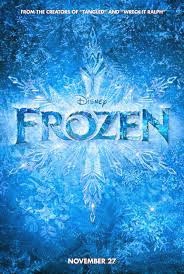FROZEN (2013) – Film Review
In the kingdom of Arendelle, sisters Anna and Elsa grow up
separated by a tragic case of magic. Elsa’s ability to turn her surroundings
into ice—a power made more dangerous by its connection to her emotional
state—makes her a constant threat to her sister, and to the future of their
kingdom.
For years, Elsa’s powers are kept secret, even from Anna.
The secret makes an unwelcome public appearance when Anna finally confronts
Elsa over her lifetime of ostracism. Soon, the entire land is covered in ice.
Elsa runs away, and it’s up to Anna to bring her back and rescue Arendelle from
a perpetual state of “always winter, never Christmas” (to steal a quote from another
fantasy story).
CONTENT (C): 8 out of 10
The film has a few mild innuendos—two visual and one verbal.
All or most of these pass by without notice. (Until I double-checked the
content, I had forgotten about one instance and had missed another one
entirely.) There are a couple offhand references to bodily functions, but
nothing overtly crass or vulgar.
One protagonist’s careless immaturity, while not overtly
celebrated, is also never clearly portrayed as negative. I’m also tired of
paper-thin Disney princesses, not to mention countless other female leads
(digital, hand drawn, and live action). Hollywood’s obsession with thinness isn’t
doing anyone any favors.
In atypical Disney fashion, one character takes a few
humorous—and welcome—jabs at the prospect of rushing into romance. Love at
first sight isn’t a standard by which to base any mature relationship. This
sets the stage for a third-act display of love that focuses on self-sacrifice instead
of romance.
Voice actor Idina Menzel has called Frozen a “bit of a feminist movie.” If by feminist she means
featuring two female leads, then yes it is. But I saw chivalry on display
throughout the duration of the story—nothing that would provide confusion for
children related to gender roles (although I can sympathize with some people who
are more concerned than I am.)
ARTISTRY (A): 6 out of 10
The animation in Frozen
is gorgeous, especially when ice-related magic takes place. There are several
musical numbers, all of which help drive the story forward and/or provide comic
relief. Some of the dialogue, especially between ice harvester Kristoff and
Anna, is deliciously clever.
Unfortunately, less attention has been paid to the two
female leads. In fact, there are no strong character arcs for either of them.
As revealed by the deluxe edition soundtrack, there was originally an additional song entitled
“Life’s Too Short” (designed for around the middle of the story and once again
as a reprise) that helps provide those necessary character arcs. Alas, the song
was jettisoned from the final version of the film, robbing the princess sisters
of some much-needed depth.
According to producer Peter Vel Decho, they had
a “very short time schedule for this film,” which may be a factor in the above
problem. The shortened timeline might also have contributed to some unnecessary
slight-of-hand with one character’s motivations. I don’t mind being surprised
by plot developments, but I do mind being deceptively misled.
These deficiencies don’t derail the story; they simply
lessen its overall effectiveness. It’s still nice to see a movie where sibling
relationships get almost as much weight as romantic relationships. I just wish
the filmmakers had spent a little more time developing stronger platonic plot
points.
PREFERENCE (P): 7 out of 10
It took me a while to…well, warm up to Frozen, but I finally did. For the most part, the musical numbers
serve their purposes; I’m just not a huge fan of most of them. Some feel a
little too poppy for the context, but maybe it’s just me. The inclusion of
Norse mythology elements, while perfectly functional in the film, didn’t engage
me much either.
For me, the movie’s saving grace is its humor. There is a
sporadic sense of the film not taking itself too seriously, almost on the level
of The Emperor’s New Groove. Olaf,
the anthropomorphic snowman, is the comedic highlight of the film. Practically
everything he said or did had me in stitches. I don’t want to exaggerate, but
Olaf may be my favorite Disney sidekick, right up next to Pixar’s Dory.
The intended pathos of the film’s climax didn’t ring true to
me—due in large part, I think, to the lack of character arcs in the two female
leads. I found myself completely disengaged at the most poignant moment of the
film, and that’s saying something. I mean, I’m the guy who cries at children’s movies like hippies cry over beached whales. No tears from me during Frozen. If Anna and Elsa’s growth as
characters had been more clearly portrayed I would’ve found the climax more
moving.
I stick around for movie credits (as everyone should), and
my stick-to-itiveness was rewarded this time with a couple Easter eggs at the end,
including a funny “disclaimer.” If you see the movie, stick around to check it
out.
CAP score:
70%
